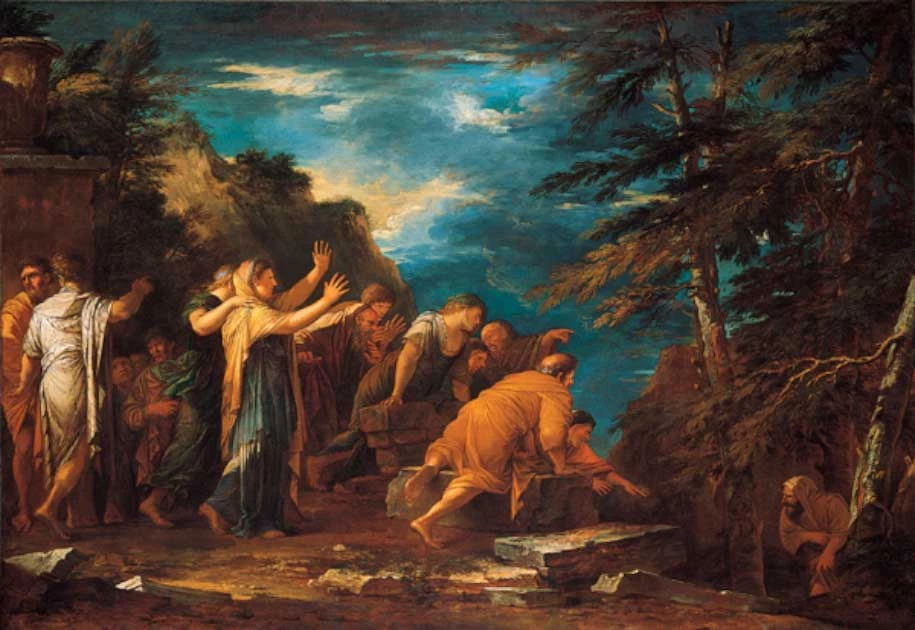Almost everyone has heard of the Pythagorean Theory, by which the lengths of the sides of certain triangles can be calculated. And the inventor of this most basic and useful tool, he ancient Greek philosopher Pythagoras, is pretty famous too.
But most people don’t know much about Pythagoras beyond the name and the business with triangles. Some might know that he lived in a cave, or that he founded a school, but little more than that.
As it turns out, Pythagoras was something of a strange person, and some of the ideas he had were very strange indeed. From vows of silence to reincarnation to trying really hard to be a vegetarian, it seems that his philosophy went to some odd places.
Here are seven of the strangest facts about Pythagoras.
1. His School of Numbers was more like a Cult
Pythagoras founded a famous School of Numbers to spread his teachings, but not all of the lessons were about application of mathematical theory, or understanding the basic principles of math. Students were taught some much more esoteric things as well.
Numbers were divine, controllers and arbiters of the entire universe, and Pythagoras taught the appropriate way to worship such divine beings. Certain numbers, such as seven, eight, and above all ten, were considered sacred and the objects of especial devotion.
This was dangerous indeed as it crossed from natural philosophy into the realm of religion, and Pythagoras found himself living in a cave (near ancient Croton in the far south of Italy) partially because he faced persecution for his beliefs. But it was the world as he saw it: numbers make the world go round, and so they should be worshipped as gods.
2. Pythagoras himself was a God
Not just the numbers getting worshipped as Pythagoras’s school. The philosopher himself also encouraged his students to see him as a demigod, known as “The Divine Pythagoras”.
And there were appropriate ways to worship Pythagoras as well, hymns to be sung for example when he was near. If anyone in the street asked who he was as he passed, they were to be told that Pythagoras was the son of Apollo himself. Or Hermes sometimes.
- Archimedes’s Weapons of War: Embellished Stories or Deadly Devices?
- The Secret Gods of the Greek Pantheon: Who Were the Cabeiri?
His powers were legendary, he could write on the moon and speak to animals, but most important of all was his golden thigh, which he used to convert new initiates his priesthood. Some stories said that those who saw it were given amazing powers.
It does sound a little dodgy, though.
3. Pythagoras and Reincarnation
So, numbers are gods and Pythagoras was a god, fine, but he didn’t stop there. Pythagoras also claimed that when he died he would reincarnate into another version of himself, and that he had been doing this for hundreds of years.

His memory, a gift from Hermes, would not forget who he was when he died and he was reborn into another body allowing him to live for ever, Pythagoras could remember when he fought at Troy, or when he had been a fisherman or even a beautiful prostitute.
He claimed that all such souls were reincarnated into new bodies, something which again landed him in hot water with Greek religious orthodoxy. Pythagoras certainly had his own ideas.
4. A Moral Vegetarian, and a Bad One
Amongst the crazy notions that Pythagoras cultivated as he formed his cult of personality there were some surprisingly modern concepts. For example Pythagoras announced to his followers that he was a vegetarian, and that eating meat was morally wrong as it was cruel to the animal.
Trail blazing stuff, but we all know that those who make the transition to vegetarianism need to be given a few occasions where they break the rules. It can be hard to give up meat, and so it seemed it was with Pythagoras.
Beef, for instance, was still on the table. Later it became apparent that when beef wasn’t available, chicken was fine as well, as was pork and goat. Lamb was definitely not allowed though, and I think we can all salute Pythagoras and his followers in bravely and selflessly giving up meat, so long as it was lamb.
5. A Silent Congregation
Perhaps surprisingly, the queue to join the inner circle of this cave-dwelling vegetarian stuck worshipping numbers in a cycle of reincarnation was a long one indeed. Pythagoras didn’t make it easy to be his friend, either.
New students looking to join Pythagoras were not allowed to speak, for example. For five years. During that time the students were not allowed to say one word, remaining pure as they absorbed the wisdom of his philosophy.
- Forgotten Technology: Ten Secrets we have Lost
- Isaac Newton and the Occult: What Secrets did the Great Man Uncover?
How students dealt with ordering which meat to have with their vegetarian supper, or politely declining when Pythagoras wanted to show them his golden thigh, is not recorded. Although it does seem that the local populace, thoroughly weirded out by Pythagoras, were happy to see some quieter acolytes for a change.
6. He Killed a Man for his Evil Numbers
Remember how Pythagoras worshipped numbers and taught that they were actual divine objects? And remember how it really looks like his whole cult school is a front to get rich from devoted followers? Well, it seems that Pythagoras was drinking the Kool Aid too, and he really believed what he was saying.

He killed a follower for it, at least. Hippasus was one of Pythagoras’s closest followers, a man who totally bought into the whole scene, wobbly vegetarianism, years of silence and everything. But this led him to dabble in dangerous magicks, and this led him in turn to heresy.
Hippasus presented a proof to his master that the square root of two was irrational, a fact widely known today. But the idea of an irrational number, that defied recording and went on forever in smaller and smaller decimal increments, deeply troubled Pythagoras.
So Pythagoras seized Hippasus and drowned him over the side of the boat they were in, throwing his body into the water and telling the shocked acolytes who had witnessed the murder not to say anyone. That’s how you deal with heresy in the church of Pythagoras.
7. He Died Defending Vegetables
Another rule Pythagoras had was that you could not eat fava beans. This was because they caused flatulence (true) creating a smell like that of dead people (also true) and causing those who were flatulent to lose a portion of their soul with the escaping gas (unproven).
Over the years “don’t eat the beans” became “beans are sacred” and the school of Pythagoras started to worship the plants themselves, alongside the numbers that they were also worshipping, and Pythagoras that they were also, also worshipping. But, in a cautionary tale for any who wish to raise a vegetable to godhood, this odd quirk in their religion led to the death of Pythagoras.
It was said that visitors to the great philosopher became angry when he refused to come out from behind a curtain to speak to them: it was just a thing he did. The visitors them set fire to the curtain, which quickly spread to the house.
Pythagoras fled out of the back door but his escape was blocked by a field of fava beans. Unable to cross them without crushed the plants, the visitors caught up to Pythagoras and, despite now being able to see him clearly as requested, they cut his throat and stabbed him to death.
Top Image: Pythagoras hard at work, doubtless writing some new rules for his students to follow. Source: Raphael / Public Domain.
By Joseph Green